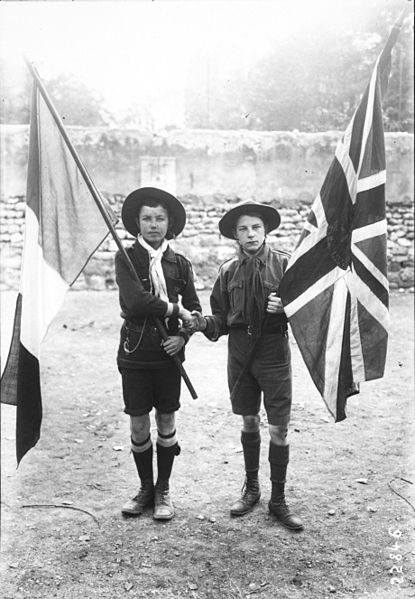The Entente Cordiale comprised a series of agreements signed on 8 April 1904 between the United Kingdom and the French Republic which saw a significant improvement in Anglo-French relations. On the surface, the agreement dealt with minor issues related to fishing and colonial boundaries. Egypt was recognized as part of Britain's sphere of influence, and Morocco as part of France's. The Entente was not a formal alliance and did not involve close collaboration, nor was it intended to be directed against Germany. However, it paved the way for a stronger relationship between France and Britain in the face of German aggression. It should not be mistaken for the official Anglo-French military alliance, which was only established after the outbreak of World War I in 1914.
A 1904 French postcard showing Britannia and Marianne dancing together, symbolizing the newborn cooperation between the two countries
French and British scouts, with their respective national flags, shaking hands. 1912
Image: "L'oncle de l'Europe" devant l'objectif caricatural images anglaises, françaises, italiennes, allemandes, autrichiennes, hollandaises, belges, suisses, espagnoles, portugaises, américaines, etc. (14796639753)
The French Third Republic was the system of government adopted in France from 4 September 1870, when the Second French Empire collapsed during the Franco-Prussian War, until 10 July 1940, after the Fall of France during World War II led to the formation of the Vichy government.
Proclamation of the abolition of the monarchy in front of the Palais Bourbon, seat of the Corps Législatif, on 4 September 1870
A French propaganda poster from 1917 is captioned with an 18th-century quote: "Even in 1788, Mirabeau was saying that War is the National Industry of Prussia."
The Sacré-Cœur Basilica was built as a symbol of the Ordre Moral.
Georges Ernest Boulanger, nicknamed Général Revanche







